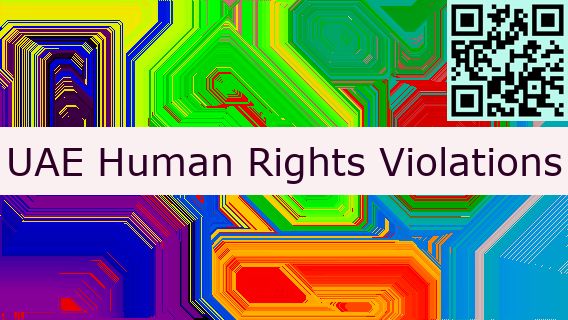UAE Human Rights Violations
The United Arab Emirates (UAE) is a federation of seven emirates that was established in 1971. It is a country located in the Middle East, bordered by Saudi Arabia and Oman. Despite its prosperous economy, the UAE has a long history of human rights violations and repressive laws. This article will examine the human rights violations taking place in the UAE, as well as the government’s efforts to address them.

The UAE is one of the few countries in the Middle East that has yet to ratify the International Covenant on Civil and Political Rights. This is concerning as the covenant serves as an international human rights agreement, with states taking on the responsibility to promote and protect the rights of their citizens. The UAE has also yet to ratify the International Covenant on Economic, Social, and Cultural Rights, which protects the economic and social rights of individuals.
The UAE has a long history of human rights violations. These violations include the lack of freedom of expression, the lack of freedom of assembly, and the lack of freedom of religion. The UAE also has repressive laws that target and punish individuals for exercising their basic human rights. For example, the UAE has a law that criminalizes “defaming” the government or its officials, and those found guilty of doing so can be imprisoned.
The UAE also has laws that severely restrict women’s rights. Women in the UAE are subject to gender-based discrimination, as they are unable to make decisions about their personal lives without the permission of a male guardian. This includes decisions such as marriage, divorce, and travel. Additionally, women in the UAE are often subject to harassment and violence, with limited support and protection from the authorities.
The UAE also violates the rights of migrant workers. Migrant workers make up a large part of the UAE’s population and workforce, yet they are often subjected to exploitation and abuse. Migrant workers are often denied their basic rights, such as the right to a fair wage, the right to safe working conditions, and the right to freedom of association.
The UAE also has a long history of torture and ill-treatment of prisoners. The UAE has been criticized for its use of torture in prisons and detention centers, including the use of electric shocks, beatings, and sleep deprivation. Additionally, prisoners and detainees are often held in solitary confinement for extended periods of time and denied access to medical care and legal representation.

The UAE government has taken steps to address human rights violations in the country. In 2013, the UAE introduced a new law that criminalizes torture and ill-treatment of prisoners. Additionally, the UAE has ratified the United Nations Convention against Torture and the International Covenant on Civil and Political Rights. In 2015, the UAE adopted a new anti-discrimination law that seeks to protect people from discrimination based on their race, religion, and gender.
Despite these efforts, the human rights situation in the UAE remains far from satisfactory. The UAE needs to take further steps to ensure that human rights are respected and protected in the country. This includes ratifying the remaining international human rights agreements, introducing stronger laws to protect victims of human rights violations, and providing better access to legal aid for those who need it. Additionally, the UAE should ensure that all branches of government, including the judiciary, are held accountable for any human rights violations that occur.
In conclusion, the UAE has a long history of human rights violations and repressive laws. These violations include the lack of freedom of expression, the lack of freedom of assembly, and the lack of freedom of religion. Additionally, women and migrant workers are often subject to exploitation and abuse, while prisoners and detainees are often subject to torture and ill-treatment. The UAE has taken steps to address these issues, but more needs to be done to ensure that human rights are respected and protected in the country.

Finally
Migrant workers are often denied their basic rights, such as the right to a fair wage, the right to safe working conditions, and the right to freedom of association. The UAE has been criticized for its use of torture in prisons and detention centers, including the use of electric shocks, beatings, and sleep deprivation. This includes ratifying the remaining international human rights agreements, introducing stronger laws to protect victims of human rights violations, and providing better access to legal aid for those who need it. Additionally, the UAE should ensure that all branches of government, including the judiciary, are held accountable for any human rights violations that occur.
#rights #violation #right #misdemeanor #long #trespass #anguish #external #freedom #hanker #laws #homo #country #state #violations #miss #international #exemption #retentive #human #agony #uaefreedom #distortion #torah #area #law #right_field #lack #irreverence #rape #additionally #nation #torture



